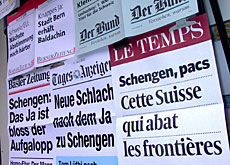
Press applauds “yes” to Schengen/Dublin

The Swiss press has welcomed Sunday's nationwide vote in favour of the Schengen/Dublin treaties governing closer cooperation with the European Union.
But the media has warned that September’s vote on extending the free movement of people to the ten new EU member states will prove to be a stiffer test of public opinion.
“Switzerland has destroyed a frontier,” was the title of the Geneva-based Le Temps.
“With a 54.6 per cent yes vote, the government can breathe a sigh of relief without crowing about it,” said the paper.
According to Le Quotidien Jurassien, “reason and wisdom” carried the day.
Both the Neue Zürcher Zeitung (NZZ) and the Tages-Anzeiger called the decision a “further pragmatic step” for bilateral relations with the EU.
The Tages-Anzeiger noted that the atmosphere ahead of the nationwide vote “couldn’t have been more exciting” after the recent rejection of the EU constitution by France and the Netherlands.
Le Temps said that the vote had split the country along tradition lines, with western Switzerland in favour and eastern Switzerland – with the exception of Zurich and Zug – against.
Explaining the “no” vote in the Italian-speaking canton of Ticino, the main daily, Il Corriere del Ticino , said this could be attributed to the fact that Ticino was a border canton and that people were concerned about security.
Lost support
Many newspapers noted that the “no” camp, headed by the rightwing Swiss People’s Party, had lost support.
The mass-circulation Blick led on this, calling the vote “a black Sunday for the People’s Party”.
It said that the People’s Party – which ran an emotive campaign against Schengen/Dublin in the run-up to the vote – had attempted to turn the vote into a referendum on whether Switzerland should join the EU.
“The people gave a clear answer, and not in the way that the People’s Party wanted: ‘yes’ to a security policy with the EU,” said the Blick.
Many of the French- and Italian-speaking newspapers made similar comments in their editorials.
Next step
The German-speaking dailies seemed to be more concerned about the next step – the September vote on whether to extend an existing accord with Brussels on the free movement of people to include citizens from the ten new EU member states.
“No breathing space after the ‘yes’ to Schengen,” warned the Tages-Anzeiger on its front page, while the Basler Zeitung said the “fight” had “just begun”.
The Basel-based paper added that the September vote would be about jobs and the conflict would be “fiercer and the outcome closer”.
The Tages-Anzeiger said the campaign ahead of the free movement of people vote could be used by opponents of closer ties with EU for more scaremongering – just as in the Schengen/Dublin vote.
“The grimaces on the posters and the absurd slogans (‘Schengen brings unemployment’) were a taste of what’s to come in the next campaign.”
The NZZ said supporters of September’s vote would have to send a clearer message about the benefits of signing up to the accord.
International view
The vote also aroused interest in the international press. The Financial Times noted that the Swiss “narrowly supported” closer EU links and that the result “pointed to greater tensions in the next big referendum” – a reference to September’s vote.
“This issue is more controversial than the one taken yesterday – and could have even more serious consequences in the case of a ‘no’,” it said, adding that this could throw the whole package of bilateral treaties with the EU into doubt.
For the International Herald Tribune, the result went against the prevailing mood in the EU but showed how things were changing in a country which fiercely safeguards its neutrality.
Meanwhile, the London-based Times said Switzerland “had expressed a measure of confidence” in the EU.
“Contrary to expectations, the French and Dutch rejections of the EU constitution may have made the EU more attractive to the Swiss, who seem to view the results either as a protest against European enlargement or against the formation of a European superstate.”
Registered partnerships
Sunday’s other vote – 58 per cent vote in favour of registered gay partnerships – was also welcomed, although it received far fewer column inches than the Schengen/Dublin referendum.
Most newspapers said that the “yes” vote showed the emergence of a tolerant modern society, which had rejected the hardline arguments of the “no” camp.
“Homosexuals are not just tolerated, they will now be considered a minority that is recognised by society,” wrote the French-speaking La Liberté. “That, essentially, is what the vote on registered partnerships this weekend was all about.”
swissinfo, Isobel Leybold-Johnson
The Swiss electorate has approved membership of the EU’s Schengen/Dublin accords with 54.6% in favour.
A new law on registering same-sex partnerships was approved by 58.03%.
Turnout in Sunday’s vote was higher than average at 55.9%.
Under the Schengen treaty Switzerland will abandon identity checks on its borders. But it will gain access to a Europe-wide crime database.
This is likely to take place in 2007.
The Dublin accord allows the Swiss to turn away asylum seekers who have already filed a request in another signatory country.

In compliance with the JTI standards
More: SWI swissinfo.ch certified by the Journalism Trust Initiative






























You can find an overview of ongoing debates with our journalists here . Please join us!
If you want to start a conversation about a topic raised in this article or want to report factual errors, email us at english@swissinfo.ch.